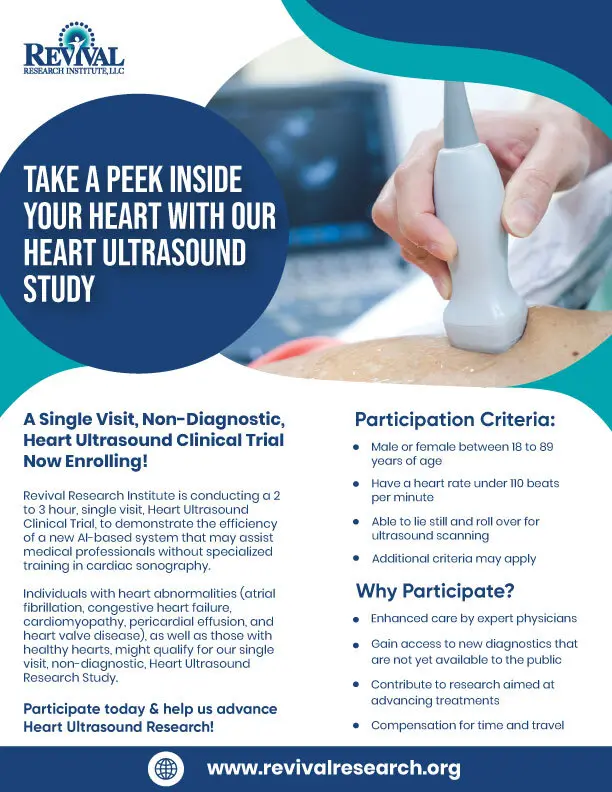Ignoring Heart Health Isn’t the Answer!
Participate in Ultrasound of Heart Clinical Trials
Heart disease is the leading cause of fatalities among men, women, and children in the United States. A heart ultrasound serves as a valuable tool for assessing the structure and function of the heart and its associated vessels. This non-invasive evaluation is quick, straightforward, and painless, utilizing ultrasound waves to generate detailed images of the heart.
We, at Revival Research Institute, are conducting Ultrasound of Heart Clinical Trials in Michigan on people with heart abnormalities (atrial fibrillation, congestive heart failure, cardiomyopathy, pericardial effusion, and heart valve disease) as well as individuals with healthy hearts.
Interested in Learning More About Your Heart Health?
You may be eligible for the Ultrasound of Heart Clinical Trials if you:
- Are you 18 to 89 years old
- Have a heart rate under 110 beats per minute
- Understand and read English
- Are able to lie still and roll over for ultrasound scanning
Our Ultrasound of Heart Clinical Trials aim to see how well healthcare staff without prior ultrasound training can be trained to collect usable images and videos of the heart.
*The study-related procedures are not a part of your usual care and will be free of cost. Participation in the Ultrasound of Heart Clinical Trials is your choice.
**To participate, fill out the form, and someone from our research staff will call you to see if you are eligible for the Ultrasound of Heart Clinical Trials in Michigan.

Ultrasound of Heart Clinical Trials in Michigan
This study is designed as an acquisition of de-identified videos and images for analysis to demonstrate the efficacy of a new AI-based system in clinical settings to assist both qualified and trained medical professionals without specialized training in sonography in obtaining diagnostic quality views.
While ultrasound is recognized as safe and does not use ionizing radiation, all ultrasound imaging for this study is non-invasive and will utilize the ALARA principle – as low as reasonably achievable – in collecting cardiac images and videos. Each patient will undergo an ultrasound test by both a nurse and a sonographer using this device.
*Taking part in the Ultrasound of Heart Clinical Trials is completely voluntary. You can stop taking part at any time.
**Study-related care is provided at no cost to participants. There is no requirement of insurance to participate in the Ultrasound of Heart Clinical Trials.
Get Started
What to Expect?
Once you agree to participate in the study, the research team will ask you to sign an Informed Consent Form (ICF). This document has all the information you may need concerning the Ultrasound of Heart Clinical Trials. The study doctor and the study team will provide guidance about the study-related procedures and treatment throughout the clinical trial. We highly encourage all our participants to ask as many questions as they would like before and throughout their participation.
You will be asked about your cardiac history along with measurement of your heart rate. As part of the key requirements for the Ultrasound of Heart Clinical Trials, you will be communicated through English language. You will also be asked to lie down and roll over for the ultrasound procedure. This clinical trial only requires a single visit.
*All study-related care is provided free of cost. Complete physical examination and other study-related assessments will be done by expert physicians and health care experts.
Age
Condition
Location
About Ultrasound of Heart Clinical Trials in Michigan

A heart ultrasound is a visual representation of the heart’s movement. During this test, a healthcare professional utilizes a hand-held device placed on the chest, emitting high-frequency sound waves (ultrasound), to capture images of the heart’s valves and chambers. This aids in assessing the heart’s pumping function.
Symptoms That May Indicate the Need for a Heart Ultrasound
- Shortness of breath or difficulty breathing
- Chest pain or pressure
- Rapid, irregular, or pounding heartbeat (palpitations)
- Swelling in the legs, ankles, or feet (edema)
- Persistent fatigue or weakness
Causes of Heart Problems Detected by Ultrasound
- Atrial fibrillation (AFib)
- Congestive heart failure (CHF)
- Cardiomyopathy
- Heart valve disease
Frequently Asked Questions
Want to Learn More About Heart Ultrasound?
We’ve answered the most common questions about this imaging test—what it is, why it’s done, what to expect during the procedure, and how it helps doctors assess heart health. Still have questions? Call us at +1 (248) 721-9539, and we’ll be happy to assist you.
What is the difference between heart ultrasound and echocardiography?
The main difference between echocardiograms and ultrasound is that an echocardiogram is usually performed by an expert cardiologist and is best used to diagnose some heart conditions. An ultrasound does not require a specialist but can be done by anyone trained in the procedure.
Can an ultrasound detect heart damage?
Heart ultrasounds aid in identifying potential abnormalities in the heart’s structure, measuring both its size and the thickness of its chambers. They also assess the movement of chamber walls and determine the extent of heart muscle damage following a heart attack.
Who is eligible to participate in the Ultrasound of Heart Clinical Trials?
If you are 18 to 89 years old, have a heart rate under 110 beats per minute, can lie still and roll over for ultrasound scanning, and are able to understand and read English, you might be eligible for the study. Once you fill the form above, our team is going to contact you and ask other questions to see if you qualify.
At what locations are the Ultrasound of Heart Clinical Trials being conducted?
The Ultrasound of Heart Clinical Trials are currently being conducted in Dearborn, Michigan. We advise you to keep an eye out for our newer studies and check out our locations near you.


